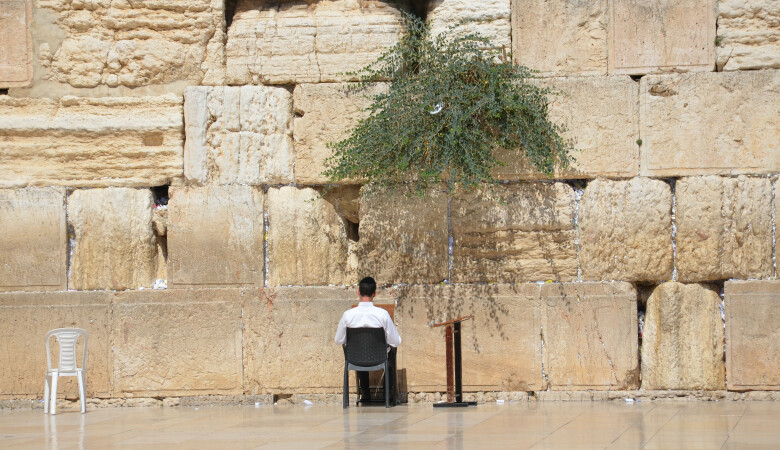Series: Mark
The Perfect Authority of Jesus (Mark Sermon 58)
August 27, 2023 | Andy Davis
Mark 11:27-33
Sovereignty of God, Supremacy of Christ
No man in history submitted so perfectly to authority as Jesus Christ. And no man in history had as much authority given by God the Father as Jesus Christ.
- SERMON TRANSCRIPT -
Turn in your Bibles to Mark 11:27-33 as we continue our journey through the incredible Gospel of Mark. In this text today, in today's passage, the religious leaders, the enemies of Jesus, surrounded Him with a challenging question on His authority. In Isaiah 6, the prophet Isaiah had a vision of the pre-incarnate Christ seated on a lofty and glorious throne. Angels known as seraphim, literally in the Hebrew “burning ones,” were constantly surrounding Him and ministering to Him. They had six wings. With two wings, they covered their faces. With two, they covered their feet, and with two they were flying and calling out to one another, "Holy, holy, holy, the Lord almighty.” The Gospel of John tells us that Isaiah saw Jesus's glory and wrote about Him. The glory of the pre-incarnate Christ enthroned.
In Ezekiel 1, the prophet Ezekiel had also a vision of the pre-incarnate Christ, seated on a high and lofty throne, a throne of fire. High above an expanse, below that expanse, were mysterious beings called cherubim, barely able to be described with human language, with fire moving back and forth amongst them. With wheels interlocking with wheels and eyes all around the rims of wheels, high and awesome, and when the pre-incarnate Christ seated on His throne spoke, they lowered their wings and stood quietly and listened to His voice.
In Revelation, the apostle John had a vision. He was invited to come up off the island of Patmos and in the spirit he was transported through a doorway into the heavenly realms, and he immediately saw a throne with someone seated on it. That throne is the center of the universe.
I. The Center of the Universe is a Throne
Everything in the universe visible and invisible revolves around that throne, whether it knows it or not. That throne is a throne of the sovereign God. The vision and revelation concerning Jesus and that throne is a little more complex. The one seated on the throne, the Ancient of Days, is Almighty God. God, the Father. Jesus in that vision is portrayed as the lion of the tribe of Judah, awesome and powerful, but also a lamb looking as if it had been slain. There is a scroll in the right hand of the one seated on the throne, almighty God. A call went out into the universe, “Who is worthy to take the scroll and open its seals?” Only Jesus in the universe was worthy and had the right to take that scroll.
He's pictured mysteriously as standing in the center of the throne, surrounding that throne are other thrones. Twenty-four elders are seated on their thrones, subordinate power; subordinate authority in a concentric circle around the throne of God. But none of them have the right to take the scroll, only Jesus. None of them has the right to stand in the center of that throne, only Jesus. There are beings that we can scarcely understand seraphim, and burning ones, cherubim, hard to describe. Archangels we’re told means “ruler angels." It's what the Greek prefix ‘“arch'" means, they’re ruler angels. Hence, there is this language of thrones and principalities and powers in the spiritual realm, authorities.
Man was created in the image of God and placed on the earth to rule over it, to subdue it, and rule over it. God reigns over all of these lesser authorities with absolute total authority on a throne of glory. Psalm 103:19, "The Lord has established His throne in heaven and His kingdom rules over all." So at the center of the universe is the throne of Almighty God, the glorious throne of God. The seraphim can't even look at it, so great is its glory. Therefore, at the center of our sin is rebellion against that authority, rebellion against the authority of almighty God. Therefore also at the center of our salvation must be submission, glad submission to that authority.
II. Jesus’ Enemies Questioned His Authority
Jesus’ enemies gather around Him to ask Him about His authority. What a moment that was. Imagine if the seraphim could have been summoned that moment, and they were asked, "What could you tell us of the authority of this one?" What would they say? "We can't even look at His glory. We'll do anything He tells us to do." If Ezekiel's cherubim were summoned and asked the same question, “Tell us about the authority of the one seated on that throne of fire,” what would they say? “When He speaks, we lower our wings, we lower our heads, we listen, we do whatever He tells us to do.” But these human beings, with utter disrespect, challenge Jesus and ask Him by what authority He is doing in these things. It's only possible because in the wisdom of God, God sent His son in the likeness of a servant and the likeness of a man. “He had no beauty or majesty to attract us to Him, nothing in His appearance that we should desire Him.” [Isaiah 53] So they saw Him as just a man. “How dare you do these things.”
This sermon's bigger than just a quick conversation between Jesus and His enemies. It really goes to the core of everything that God sent His son into the world to do. These chief priests, teachers of the law and elders of the people put their finger on the question of Jesus's authority. They're challenging Him. They were the religious leaders of the Jewish nation. Their authority was established in the human realm by the laws of Moses. Jesus said that in Matthew 23, "They sit in Moses' seat. So you must obey them and do everything they tell you. “ It was also upheld by Roman law in its wisdom. The Roman Empire did not seek to interfere with local religions and local government. They wanted them to rule. They just wanted tax money and peace, commerce. So by law, it was established there. The chief priest, teachers of the law, and the elders had authority.
Yet despite their authority, they were indeed blind leaders. Jesus calls them blind guides in Matthew 15:14, “If a blind man leads a blind man, both will fall into a pit.” Their central blindness was vertical. They didn't see their sin before Almighty God. They thought they were righteous in His sight. They sought to establish their own righteousness by their own good works. They were utterly convinced of this, and anyone that sought to point out their sin, they hated with a deep passion. Jesus says in John 7:7, "The reason the world hates me is that I testify that what it does is evil." These religious leaders were steeped in pride, spiritual pride, but they also had pride of their position and their power and all of the prestige that flowed in because of that position of power. Anyone who challenged that, including their money, their flow of revenue, anyone that challenged that was their enemy. But Jesus openly challenged it, their authority, and He openly challenged their righteousness, so they were Jesus's most violent foes. Their hatred of Him went marrow deep. They're constantly opposing Him, debating Him, laying traps for Him, scheming against Him, plotting to take His life.
Here they try this frontal assault method. Look at verse 27:28, "They arrived again in Jerusalem. And while Jesus was walking in the temple courts, the chief priest, the teacher's law, and the elders came to Him. 'By what authority are you doing these things?' They asked, and who gave you authority to do this?" What do they mean by these things? What are they upset about? Jesus' recent actions were offensive to them, shocking even. Think back to the triumphal entry, Jesus is acclaimed as the Son of David. They're all cheering for Him. “Hosanna” calling out, “save.” Jesus accepted this worship, even defended it. On the second day, He cleansed the temple. Look at verses 15-17, "Jesus began driving out those who are buying and selling there. He overturned the tables of the money changers and the benches of those selling doves and would not allow anyone to carry merchandise through the temple courts."
And as He taught them, He said, "Is it not written? My house will be called a house of prayer for all nations. But you have made it a den of robbers." Look specifically at that statement in verse 16. He would not allow anyone to carry merchandise through the temple courts. I mean, these are caravans that are just making the temple a thoroughfare. It was just easier to get from point A to point B right across the holy ground. Jesus said, "Absolutely not. Not today. You're not doing that." He stopped them. Who is He to do that? To forbid them from coming across. Those buying and selling in the temple worked directly for Annas, the high priest, the real high priest, and for Caiaphas, his son-in-law who is the puppet high priest. He worked directly for that wicked family.
So Jesus' authority to do that was specifically in their minds because they had charge of the temple area in that whole system. So here the chief priest and the elders assume that they were operating from position of strength. By this they could, they thought, humiliate Jesus. They were the religious authorities in Jerusalem. They ruled the temple and everything to do with it. They had absolutely not given Jesus the right to overturn those tables. They'd absolutely not given Him the right to stop the commerce going across. They had absolutely not given Him permission to walk around teaching the people there in the temple area. They knew that. Even the Roman governor, Pontius Pilate upheld their authority on pain of law. If any Roman soldier went in the temple area, the Romans themselves would see to it that they would be executed. They upheld the authority of these Jewish leaders. These men truly were in charge of the temple and they're demanding from Jesus, "Show us your credentials. What right do you have to do this?” The Jewish leaders thought they had trapped Jesus. They figured they had Him either way, either He had to acknowledge that He had no authority to do what He had been doing, in which case He would be humiliated before them or He would claim to be operating directly under God's authority, in which case they would've grounds to execute Him for blasphemy. Either way, they had Him, so they thought. Tragically, really tragically, they never stopped to consider, is it true? Could Jesus really be who He claimed to be, the son of God, the Messiah, the Savior of the world? These are not truly religious men, they’re not truly religious seekers. They don't want the truth. They were hardened hypocrites. They were whitewashed tombs seeking to protect their own power and authority and self-righteousness. That's who they were.
Let's try to understand this issue of authority. What is it? A definition could be this: authority is the God-given right to command, thought and or behavior in a certain area or realm. Authority is the God-given right to command. Keep it simple. The God-given right to command, command behavior in a certain prescribed realm. That's what authority is. The Bible teaches us that all genuine authority comes from God, from that throne that I began the sermon, all authority flows from that throne, genuine authority. Romans 13:1 "Everyone must submit Himself to the governing authorities for there is no authority except that which God has established." The authorities that exist have been established by God. That's the truth. The biblical truth about authority. It's a God-given right to command in a certain realm. It comes from God. That's what “God-given" means, and everyone must submit Himself to those governing authorities.
I'm going to make two assertions that are going to kind of dominate the next part of the sermon. Two assertions about Jesus. Number one, no man in history so perfectly submitted to authority as Jesus Christ. No man in history so perfectly submitted to authority as Jesus Christ. Number two, no man in history has as much authority as Jesus Christ. No man is as perfectly submissive to authority and no man wields so much authority.
"Two assertions about Jesus, number one, no man in history so perfectly submitted to authority as Jesus Christ. Number two, no man in history has as much authority as Jesus Christ. No man is as perfectly submissive to authority, and no man wields so much authority."
Let's look at the first. No man in history so perfectly submitted to authority as Jesus Christ. Why do I say this? Let's keep it simple. Because Jesus never sinned, because Jesus never sinned. All sin is an abrogation of God's authority, a rejection of God's authority. Jesus was born, we're told under the law, and He lived His whole life until the moment of His death under the law of Moses. He perfectly fulfilled it. He never violated one of its precepts, not one of its major or minor precepts, not once. He was perfectly submissive to His parents, imperfect as they were. They were good people, but they were still sinners, yet He submitted to His parents. The Bible tells us that openly, He was submissive to them. He was the only perfectly obedient child in history. Some of you may have a claim, but I'm not going to believe it. The only perfectly obedient child that's ever grown up in any family is Jesus. I've often wondered about His younger brothers and what a burden that was hearing from Mary. "Why can't you be like your brother Jesus? He never gives us any trouble." Jesus was even perfectly submissive to the wicked authorities that killed Him. “He was led like a lamb to the slaughter and as a sheep before its shearers was silent, He did not open His mouth.”
He was submissive to them, but supremely, He was submissive vertically to His father. In every respect, He submitted to His father, every moment. Jesus's fundamental submissiveness to God was predicted in many places in scripture, but especially Psalm 40:7-8. There, the Psalm prophetically says of Jesus, "Here I am, I have come. It is written about me in the scroll. I desire to do your will, O my God, your law is written within my heart." Think about that. That's Jesus. The author of Hebrews says that's Jesus saying that to His father. “Your law is written in my heart. I'm here, Father, to do your will.” Philippians 2 says, "Jesus made Himself nothing. Taking the very nature of a servant being made in human likeness and being found in appearance as a man, He humbled Himself and became obedient to death, even death on a cross." Perfectly submissive to His father. John's Gospel testifies about this over and over and over and over again. So many verses I could have chosen, but here's a few. John 6:38, Jesus said, "For I've come down from heaven not to do my own will, but to do the will of Him who sent me." John 5:30, "I seek not to please myself but Him who sent me." John 8:28, "I do nothing on my own, but I speak just what the Father has taught me to say." I don't even say a word except what the father's told me to say. Then in the very next verse, John 8:29, "I always do what pleases Him." It’s an incredible statement. Ultimately, this comes fulfilled in Gethsemane, when God the Father reveals, supernaturally, reveals the cup that He's going to have to drink to save our souls, the cup of His wrath, the infinite wrath of God. Jesus is literally knocked to the ground and He's asked a question by the Father, "Will you drink it?" He said, "Abba, father, everything is possible for you. Take this cup from me, yet not my will but yours be done even if it costs me my life." Hence my assertion that no one in history has been as submissive to authority as Jesus Christ.
But the real issue here that His enemies are bringing is Jesus' wielding of authority. Did He have the right to cleanse the temple? Did He have the right to walk through the temple and teach the people? Did He have the right to do all of the amazing things He was doing? By what authority was He acting like this? And who gave Him that authority? Now here I make this assertion, no man in history had or has as much authority as Jesus Christ. His authority was displayed in many ways.
First, in His teachings. Jesus taught like no man anyone had ever heard. No one spoke like this man. The Jewish teachers frequently cited other rabbis or other authorities based on their assertions. This rabbi said this, commenting on this thing that was said by this other rabbi, Jesus didn't do any of that ever. Seventy-five times in the Gospels, He said, "Truly, truly, I say to you." You see it very plainly in the Sermon of the Mount. "You have heard that it was said to the people long ago, do not murder and anyone who murders will be subject to judgment. But I tell you that anyone who is angry with His brother will be subject to judgment." Again, “You have heard that it was said, you shall not commit adultery. But I tell you that anyone who looks at a woman lustfully has already committed adultery with her in His heart." “You have heard, but I say to you.” Doesn't that beg the question? Who are you? At the end of the Sermon on the Mount, it was said, "When the people heard Him, they were astonished because He taught them as one who had authority and not as their teachers of the law."
Jesus authority was also displayed in His miracles like authority over demons. Again and again in Mark's Gospel, have we not seen how the demons instantly obeyed Him? They were clearly terrified of Him. No doubt about it. Even Legion was terrified of Jesus. Jesus had authority over every disease and sickness, He rebuked a fever and it fled like it was some living thing. When Jesus came around, sickness ran away from Him. There was no disease or sickness He couldn't heal, absolute authority over it. He had authority over fish. He made fish swim into nets. “All right, all you fish take a strong left-hand turn,” and they all go into the nets, or one single fish with a coin in mouth found its way to Peter's hook. He had authority over matter, material. He created loaves and fishes out of nothing. He created Malchus' ear out of nothing. He had authority over weather, over the wind and the waves. He stretched out His hands over the storm and said, "Peace be still,” and it instantly obeyed Him. The weather obeyed His voice. He had authority over death. He spoke to Lazarus and said, “Lazarus, come forth,” and He came out. He had authority, claimed authority that only God has. He dispensed with the traditions of the elders, the hand washing and all of that, as manmade rules, he dispensed with them. He declared all foods clean, ending the old covenant dietary laws.He had the right to declare all foods clean.
He claimed absolute authority over the Sabbath. Imagine this statement, the Son of Man, “I am Lord even of the Sabbath.” I'm in charge of the Sabbath. It’s an amazing statement made to the Jews. Only God could have said that. He sent out His apostles with authority. He delegated authority of them. They could drive out demons and heal people and preach the gospel. But especially, and this is where the rubber meets the road with us, He has the authority to forgive sins. How good is that news, dear friends? If Jesus tells you that your sins are forgiven, they are. In Mark 2, He healed a man to prove that the Son of Man had authority on earth to forgive sins. He ultimately has the authority to judge the world. He will be the judge of all the earth. All the nations will be gathered before Him, and He will separate the nations, all the peoples of the earth into two categories, believers and unbelievers, sheep and goats. He has that power. He has that authority.
He has the authority over His own life, death and resurrection. He said in John 10:18, "No one takes my life from me, but I lay it down of my own accord. I have the authority to lay it down and I have the authority to take it back up again. This command I receive from my father.” “I can die whenever I choose and I can come alive again whenever I choose. God gave me that right." He is the authority to give eternal life to whoever He chooses to give it. John 17:2, "He prayed to His father. You granted Him authority over all people that He might give eternal life to all those you have given Him." “Him” being Jesus in that sentence. He has the right to give you and me eternal life.
On trial, before Pontius Pilate, just like Jesus's enemies, Pilate did not know who He was dealing with. Pontius Pilate was frustrated that Jesus wouldn't answer him at one point. "Do you refuse to answer me? Don't you realize I have power either to free you or to crucify you?" And Jesus answered, "You would have no power over me if it were not given you from above." After His resurrection, He made this supreme claim, "All authority in heaven and on earth has been given to me." Think about that claim. All authority in heaven and earth has been given to me. The Bible makes it plain in Psalm 1:10, "God, the Father said to the son after His resurrection, sit at my right hand until I make all your enemies a footstool for your feet." Right hand of what? Of the throne of power, throne of God. In Ephesians 1:20-22, "God raised Him from the dead and seated Him at His right hand in the heavenly realms, far above all rule and authority, power and dominion, and every title that can be given, not only in the present age, but also in the one to come. And God placed all things under His feet and appointed Him to be head over everything for the church, which is His body, the fullness of Him who fills everything in every way." That's amazing. Ephesians 1 says, Jesus is not just above authority but far above, infinitely, above all authority. The gap between Jesus and whatever's in second place behind Him in authority is infinite, far above all rule and authority, all authority in heaven and earth. That's the true answer to their question: “Who gave you this authority? His answer is, "Almighty God gave me my authority." So I say, no man in history has as much authority as Jesus Christ.
III. Jesus Challenges His Enemies
Let's look at the conversation here between Jesus and His enemies, now that we've set it up. Jesus knew that they could never accept this truth about His authority. He doesn't try in this conversation to say all these things. They're all true. But He doesn't try to do that. They would consider His claims to be blasphemous. When He said to the paralyzed man, "Your sins are forgiven,” they thought He was blaspheming saying, "Who can forgive sins but God alone?" When He defended His healing on the Sabbath by saying, "My father is always working and I too am working,” they picked up stones to stone Him. They're not going to listen to Him, He knows that. So instead He asked them a question. Look at verse 29-30. Jesus' counter question, “Jesus replied, ‘I'll also ask you one question. Answer me and I'll tell you about what authority I'm doing these things. John's baptism, was it from heaven or from men? Answer me.’" Jesus seizes control here. Do you see that? He's taking charge of this conversation. He's never reacting to them. They have to now react to Him. Notice that they thought to trap Him, yet actually the shoe’s on the other foot. He ends up trapping them in their own cowardice. Jesus sets them a condition. If they meet it, He'll answer their question. If they don't, He won't.
Jesus's question is not a diversion or attack. It actually goes to the heart of the issue. Are they able to recognize God ordained spiritual authority or not? Wouldn't you say consistently the problem of Israel is that they hated the messengers God sent to them and sought to kill them? It happens over and over. That's a fundamental blindness the Jewish nation had. So Jesus goes into this, the origin of John's baptism.
Let's talk about that. John's baptism is a symbol of His entire ministry. In John the Baptist’s ministry, baptism was at the center of it. Now, baptism, John's baptism, was a new thing in the history of Israel. There's no command or example or anything of it in the 39 books of the Old Testament. It's not an Old Testament ordinance or anything. It's a new thing. Scholars tell us that in the intertestamental period when the Jews had been scattered throughout the Gentile world because of the Diaspora, because of the Assyrian invasion and the Babylonian invasion and the Jews were everywhere, many Gentiles wanted to become Jews. They learned about monotheism. They wanted to follow the God of Abraham, Isaac and Jacob. They wanted to become Jews. The men had to be circumcised, but both men and women converts to Judaism, had to have a bath, to cleanse them of their nasty Gentile paganism. So it wasn't commanded, but that's just what they did. Now, along comes John. Who is he baptizing? Jews. “So you're saying we're as dirty and filthy as Gentiles.” “Yeah, that's exactly what I'm saying.” He came and preached a baptism of repentance for the forgiveness of sins. “And do not think you can say, we have Abraham as our father. I tell you, out of these stones, God can raise up children for Abraham.” Don't bank on that.
So the question is, where did all that come from? The baptism, John's baptism. Who gave John the authority to do this ministry? Who sent him to baptize? John the Baptist was an enigmatic, divisive, shocking figure. He appeared in the foreboding spirit of Elijah, dwelling out in the desert, wearing camel's hair and a leather belt around His waist just like Elijah did. He ate locusts and wild honey, like Elijah. He was utterly devoid of love for worldly comforts and luxuries. He had no interest in them. Like Elijah, John was utterly fearless, a preacher of the truth, no matter what. Like Elijah, John's words were fiery. They called on his hearers to repent. Like Jesus, John the Baptist singled out these specific men and opposed them publicly.
When John saw many of the Pharisees and Sadducees coming to where he was baptizing, He said, "You brooded of vipers who warned you to flee from the coming wrath, produce fruit in keeping with repentance." So they are questioned by Jesus. "Where did John's baptism come from? Who gave Him the authority to do it?" The Pharisees and Sadducees pull off into an unholy huddle. They pull off and they're just talking among themselves. Look at verse 31:32, "They discuss it among themselves and said, if we say from heaven, He will ask them, why didn't you believe him? But if we say from men, they feared the people, for everyone held that John really was a prophet." Rather than trapping Jesus, it was Jesus who trapped them. They hated John as much as they hated Jesus for the same reasons. But the crowds loved John, especially now that Herod had martyred him. There was no doubt in the crowd's mind that John was a prophet sent from God. That's done. Everybody knew that. These wicked men were afraid of the crowd's reaction.
So what is the truth about John the Baptist? God sent Him. In the Gospel of John 1:6-7, it addresses John the Baptist. It says, "There came a man sent from God whose name was John." Well, that settles it. Don't you think that settles it? I think it does. He was sent from God. God sent him. Later that same chapter, John 1:32 and following, John gave this testimony when he saw Jesus and he identified Him and said, "Behold the lamb of God who takes away the sins of the world." John gave this testimony. "I saw the spirit descend from heaven as a dove and remain on Him. I would not have known him except that the one who sent me to baptize with water told me, the man on whom you see the spirit descending or remaining is the one. He is the one who will baptize with the Holy Spirit. I have seen and I testify that this man is the son of God." But within that answer, listen to what he said, “The one who sent me to baptize with water.” Who's that? God. God sent him to baptize in water. The fact is this is a regular pattern. It's a tragic pattern in Israel's history of hating the messengers God sends and not recognizing their authority. It happened over and over. A very good example of this is Amos the prophet to the wicked northern kingdom of Israel. Amos was from the southern kingdom and he was sent by God up to the wicked idolatrous northern kingdom of Israel to prophesy. A priest named Amaziah confronted him and said to Amos, "Get out, you seer. Go back to the land of Judah. Earn your bread there and do your prophesying there. Don't prophesy any more here at Bethel because this is the king's sanctuary and the temple of the kingdom." That's an authority issue. "I'm warning you keep doing this, we will kill you." Then Amos answered the priest Amaziah, "I was neither a prophet or a prophet son. I was a shepherd and I also took care of sycamore fig trees." I love that line, “I was particularly good at sycamore fig trees.” But anyway, "The Lord took me from tending the flock and said to me, go prophesy to my people Israel. That's why I'm here."
IV. Jesus’ Enemies: Unbelieving, Lying Cowards
So enemies of Jesus, do you believe in that whole thing? Do you believe that God can raise up someone and anoint him with the Holy Spirit and send him to the people? Do you believe in that? No, they didn't. They didn't. Let me just tell you right now, we're all sinners. We've all violated God's laws. We will be saved only if we believe the prophets. It's the only way we're going to be saved. This is the Word of God sent through people, and you'll be saved if you believe it. Well, they didn't. They told us this. Jesus told us what they thought about John, “John came neither eating nor drinking and they said He has a demon.” They thought He was demon possessed. They thought Jesus was demon possessed and therefore none of these religious leaders of Israel had submitted to John's baptism. Luke 7:30, "The Pharisees and experts of the law rejected God's purpose for themselves because they had not been baptized by John." They did not receive the baptism.
They did not believe he was a true prophet sent from God. They did not believe his message that the kingdom of God was near and they certainly didn't believe the one who came after him, the thongs of whose sandals John was not worthy to untie, the one who had baptized with the Holy Spirit and fire. They didn't believe Him either. To believe in John was to believe in Jesus. They were linked together. It was John that testified that "Jesus is the lamb of God who takes away the sins of the worlds. And I have seen and I testify, that He is the son of God."
They had unbelief, but they also had cowardice. Why didn't they just say we think He was a false prophet? We think John was a quack, he was demon possessed and a bad man. Why didn't they say that? The text tells us they were afraid that they were going to get killed. They were afraid of the people. They didn't have the courage of their convictions. In Luke 20:6 it says, "But if we say from men, all the people will stone us because they're persuaded that John was a prophet." So they lied and said, "We don't know." And just understand who they are. They are the spiritual leaders of the nation of Israel. Along comes a massive figure like John the Baptist, and they're not sure about him. It's like, well then, what is your function here? You don't have any role at all. You don't know one way or the other.
Jesus judges them with a profound judgment. Silence. The silence of the Word of God. Do you understand what a privilege it is to hear God's Word? It is a privilege. It is a privilege to have God speak to you by His Word. Jesus says, "All right then I'm not going to tell you by what authority I'm doing these things." Amos, that same prophet, said that he would judge Israel by sending a famine because they did not hear the word of the Lord. There is a window of opportunity for all of us sinners, and it all has to do with what you do with the prophetic word, apostolic word. Seek the Lord while He may be found. Call on Him while He's near. You have an opportunity now to believe the preached word.
"Recognize the heavenly origin of Jesus' authority… And what authority? Well, first and foremost relevant to you and me is the authority to tell us that our sins are forgiven through faith in His name."
V. Lessons
What are the lessons from this? First of all, recognize the heavenly origin of Jesus' authority. Jesus' authority was established by His miracles, by His teachings, by His fulfillment of prophecy. It was all there. His credentials were absolutely in place. And what authority? Well, first and foremost relevant to you and me is the authority to tell us that our sins are forgiven through faith in His name. How beautiful is that? To have the judge who's going to sit on your case tell you ahead of time before your trial, on judgment day, "You will be acquitted, you will be forgiven, you'll be welcomed into heaven." How beautiful is that? On what basis? All you need to do is do what He said, what John the Baptist said, repent and believe the good news of the kingdom of God. Repent and believe that Jesus Christ shed His blood for your sins and you'll be forgiven. In order to do that though, you have to be willing to submit to Jesus' yoke.
We sang about that in the “Come to Me” song. What a beautiful song that is. In some of the most beautiful words Jesus ever spoke [Matthew 11:28 -30], "Come to me all you who are weary and burden and I will give you rest." What does He say next? "Take my yoke upon you and learn from me. For I'm gentle and humble and heart, and you'll find rest for your soul. For my yoke is easy, my burden is light." The yoke, dear friends, is His kingly authority. It is His right to command you as your king. That's what the kingdom of heaven is. You're entering into glad submission to God as your king. You're done with your rebellion. His yoke is His right to tell you what to do. You're like, well, wait a minute, about what? Everything. He has the right to tell you how to spend your money. He has the right to tell you how to spend your time. He has the right to tell you what to do with your relationships. He has the right to tell you to listen to His apostles, like Paul and Peter and others. He has the right to tell you to do things. As a matter of fact, your love will be measured by your obedience, “If you love me, you'll obey me.” What that means is, “Submit to my authority, you'll do what I tell you to do.” The beautiful thing of the gospel is He enables you, empowers you to do it by His Holy Spirit. He doesn't leave you like an orphan. If you submit to Him as your savior and recognize that means yielding to Him as your Lord, He will, by His spirit, enable you comprehensively to obey Him.
Guess what? You're going to spend eternity with redeemed brothers and sisters in heaven, perfectly submissive to God, the King. You're going to enjoy every moment of it. So come to Christ, trust in Him. Make certain your sins are forgiven through faith in His name. And then, dear brothers and sisters, obey Him.
Close with me in prayer. Father, thank you for this sermon today, this chance that we've had to look at the authority of Jesus, which is infinitely greater than we can possibly imagine. Help us, O Lord, willingly, gladly to submit to His authority. Help us willingly, gladly to bring every area of rebellion in our lives under the authority of His word. Help us to realize it's not thereby that we'll be forgiven of our earlier sins, but by faith in His blood. But just because you are setting us free from sin, we're finding that your yoke is easy and your burden is light. Help us so Lord, in Jesus name. Amen.































